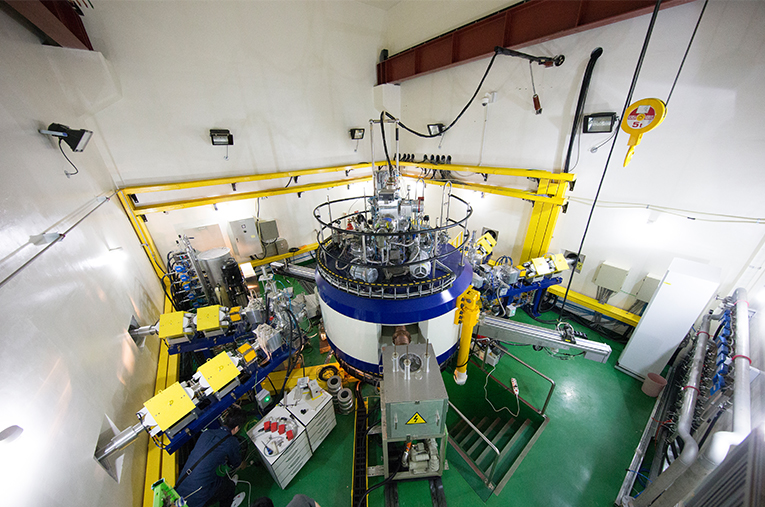Cyclotron Facility
Introduction

The RFT-30 cyclotron is a device that can accelerate
the negative hydrogen ion (H-) to a spiral trajectory and draw the proton beam of 15 ~ 30 MeV and up to 300 uA.
It is used for the development of medical radioisotopes and basic science research using proton beams.
Research field
- Development of radioisotopes, target and targetry
Production RI : F-18, N-13, C-11, Zr-89, Ge-68
Future plan : Sc-44, I-123, Co-57, Cu-64
- Development of novel isotope labeled compounds and radiopharmaceuticals
- Research on the cross-section measurement and the use of proton beams in various fields
- Solar cell or semiconductor defects, and radiation resistance of various semiconductor devices
- Evaluation and characterization of metals, semiconductors and etc.
Equipment
| Ion source | Ion Source type | Multi-cusp |
|---|---|---|
| Max. extracted beam current | 10 mA | |
| extraction ion | Negative hydrogen (H-) | |
| Extracted beam | Beam extraction | Carbon stripper foil |
| Extraction beam | Proton (H+) | |
| Max. beam currents | ~ 300 ㎂ | |
| beam energy | 15 ~30 MeV | |
| RF system | RF frequency | 63.96 MHz |
- The negative hydrogen ion extracted from the ion source is accelerated by dee and the electric field generated in the RF cavity
- The negative hydrogen ion has a circular orbit due to the magnetic field, and finally has a helical trajectory as the energy rises
- The final accelerated hydrogen anion passes through the carbon film and loses two electrons, leaving only protons, and is drawn out of the accelerator symmetrically to the tangent of the trajectory as the polarity changes
- Division: Cyclotron Application Research Section
- Manager: Park, Jeong-hoon
- Phone: +82-63-570-3571
- parkjh@kaeri.re.kr